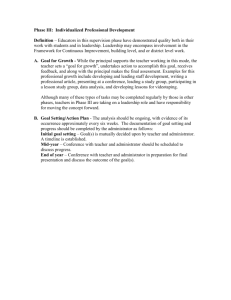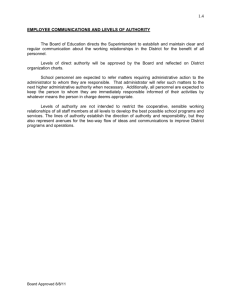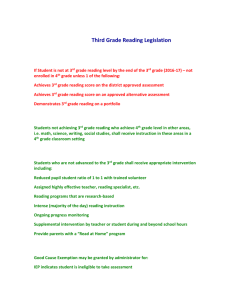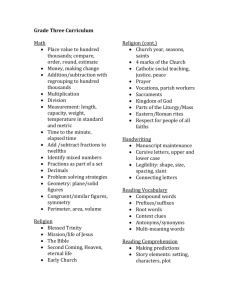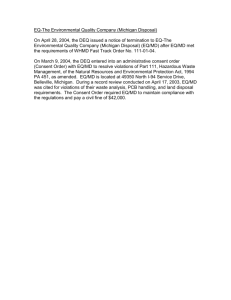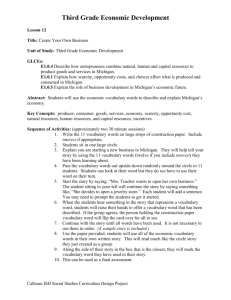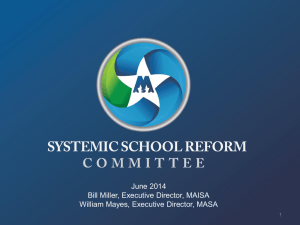New State Teacher and School Administrator Evaluation Law
advertisement
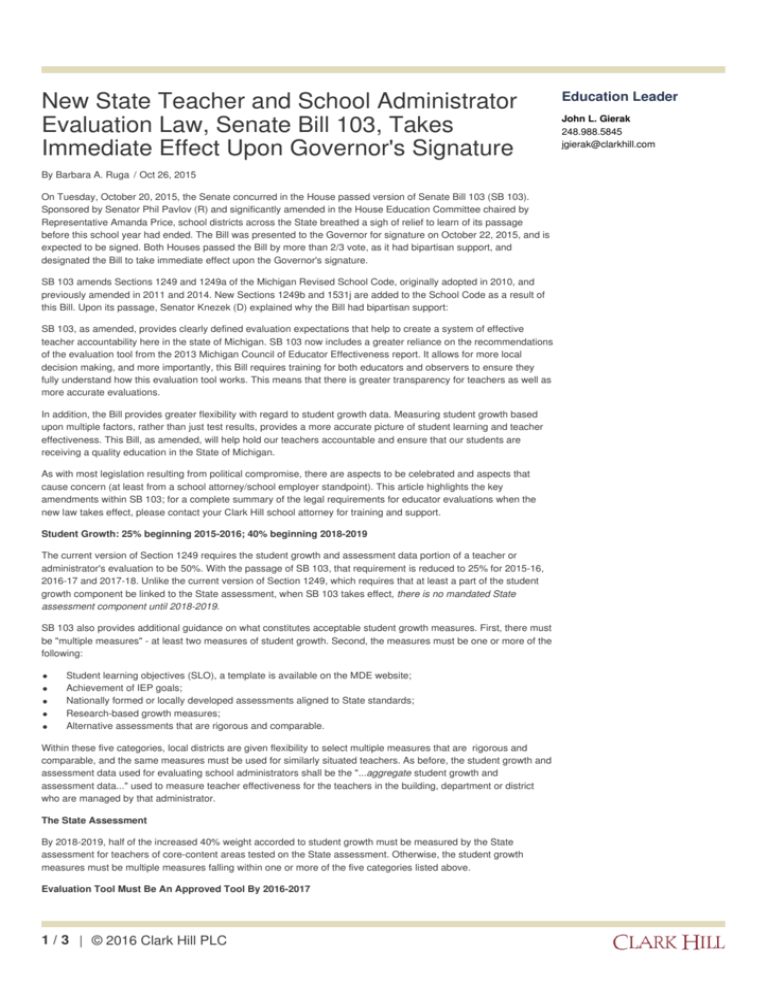
New State Teacher and School Administrator Evaluation Law, Senate Bill 103, Takes Immediate Effect Upon Governor's Signature By Barbara A. Ruga / Oct 26, 2015 On Tuesday, October 20, 2015, the Senate concurred in the House passed version of Senate Bill 103 (SB 103). Sponsored by Senator Phil Pavlov (R) and significantly amended in the House Education Committee chaired by Representative Amanda Price, school districts across the State breathed a sigh of relief to learn of its passage before this school year had ended. The Bill was presented to the Governor for signature on October 22, 2015, and is expected to be signed. Both Houses passed the Bill by more than 2/3 vote, as it had bipartisan support, and designated the Bill to take immediate effect upon the Governor's signature. SB 103 amends Sections 1249 and 1249a of the Michigan Revised School Code, originally adopted in 2010, and previously amended in 2011 and 2014. New Sections 1249b and 1531j are added to the School Code as a result of this Bill. Upon its passage, Senator Knezek (D) explained why the Bill had bipartisan support: SB 103, as amended, provides clearly defined evaluation expectations that help to create a system of effective teacher accountability here in the state of Michigan. SB 103 now includes a greater reliance on the recommendations of the evaluation tool from the 2013 Michigan Council of Educator Effectiveness report. It allows for more local decision making, and more importantly, this Bill requires training for both educators and observers to ensure they fully understand how this evaluation tool works. This means that there is greater transparency for teachers as well as more accurate evaluations. In addition, the Bill provides greater flexibility with regard to student growth data. Measuring student growth based upon multiple factors, rather than just test results, provides a more accurate picture of student learning and teacher effectiveness. This Bill, as amended, will help hold our teachers accountable and ensure that our students are receiving a quality education in the State of Michigan. As with most legislation resulting from political compromise, there are aspects to be celebrated and aspects that cause concern (at least from a school attorney/school employer standpoint). This article highlights the key amendments within SB 103; for a complete summary of the legal requirements for educator evaluations when the new law takes effect, please contact your Clark Hill school attorney for training and support. Student Growth: 25% beginning 2015-2016; 40% beginning 2018-2019 The current version of Section 1249 requires the student growth and assessment data portion of a teacher or administrator's evaluation to be 50%. With the passage of SB 103, that requirement is reduced to 25% for 2015-16, 2016-17 and 2017-18. Unlike the current version of Section 1249, which requires that at least a part of the student growth component be linked to the State assessment, when SB 103 takes effect, there is no mandated State assessment component until 2018-2019. SB 103 also provides additional guidance on what constitutes acceptable student growth measures. First, there must be "multiple measures" - at least two measures of student growth. Second, the measures must be one or more of the following: Student learning objectives (SLO), a template is available on the MDE website; Achievement of IEP goals; Nationally formed or locally developed assessments aligned to State standards; Research-based growth measures; Alternative assessments that are rigorous and comparable. Within these five categories, local districts are given flexibility to select multiple measures that are rigorous and comparable, and the same measures must be used for similarly situated teachers. As before, the student growth and assessment data used for evaluating school administrators shall be the "...aggregate student growth and assessment data..." used to measure teacher effectiveness for the teachers in the building, department or district who are managed by that administrator. The State Assessment By 2018-2019, half of the increased 40% weight accorded to student growth must be measured by the State assessment for teachers of core-content areas tested on the State assessment. Otherwise, the student growth measures must be multiple measures falling within one or more of the five categories listed above. Evaluation Tool Must Be An Approved Tool By 2016-2017 1 / 3 | © 2016 Clark Hill PLC Education Leader John L. Gierak 248.988.5845 jgierak@clarkhill.com By the 2016-2017 school year, every district must have an evaluation system that is compliant with SB 103, and each district must use an evaluation tool that has been approved by the Michigan Department of Education (MDE). MDE will develop a list of approved evaluation tools and promulgate standards by which school districts may obtain approval of their own locally developed tool. Although there is no deadline for this list, Superintendent Brian Whiston recently spoke at the Michigan Negotiators Association in Bellaire, Michigan, and stated this list would be an important project for the Department to complete on a timely basis. Certain to be on the list are the four approved teacher and two administrator evaluation tools recommended by the Michigan Council of Educator Effectiveness (MCEE) in July 2013. The evaluation tool and the criteria within Section 1248 of the Michigan Revised School Code (the layoff and recall statute), that are not already measured within the approved evaluation tool, comprise the remaining 75% of the evaluation system starting in 2016-2017, and the remaining 60% beginning in 2018-2019. (Some argue the layoff and recall criteria must be incorporated in 2015-2016, so you should consult with legal counsel on this point, as the law is ambiguous on this new feature.) School administrator tools, along with specific statutory criteria, comprise the remaining 75% (later 60%) of the administrator performance evaluation system. New Posting Requirements Effective 2016-2017 To ensure transparency, beginning in 2016-17 each school district, public school academy and intermediate school district must post on their website: Research basis for the selected tool; Authors of the tool and their qualifications; If the tool was modified or adapted (undefined terms), the identity and qualifications of the person who reviewed the tool, as well as an assurance that the modifications and adaptations do not impair the research basis of the tool; Rubrics with detailed descriptors for each performance level on key summative indicators; Description of processes for conducting classroom observations, collective evidence, developing performance ratings, and developing individualized development plans (IDPs); Plan for providing the newly mandated training to evaluators and observers. These posting requirements are mandated even if the selected tool is one recommended by the MCEE. Classroom Observations - New Requirements in 2016-2017 The longstanding statutory requirement of "multiple observations" for classroom observations is defined as two observations (identical to the definition that had been eliminated back in 2011). Beginning in 2016-2017, at least one of the two mandated observations must be conducted by the assigned evaluator, and at least one must be unscheduled. Feedback from observations must be provided to the teacher not later than 30 calendar days following the observation. As before, (at least two) observations must consist of: (1) review of the lesson plan; (2) alignment to state standards; (3) review of pupil engagement. The observer must be trained in the evaluation system and tool. Mandated Training By 2016-2017 All teachers, evaluators and observers must be trained in the district's performance evaluation system and in the tool by someone experienced with teacher evaluation and, in the case of the tool, someone experienced in using the tool, such as a consultant or someone specifically trained for the purpose of training others in the use of the tool. As noted above, a plan for training evaluators and observers must be included within the posted material. Section 95a funds are provided for training on MDE approved tools, the mechanics of which are yet to be announced. Dismissal Standards Districts must dismiss tenured teachers rated ineffective for three consecutive school years. The Bill clarifies that a district may dismiss a teacher who is not effective (rated Minimally Effective or ineffective) without waiting for three consecutive years. Notice of Ineffective Teacher Postponed to 2018-2019 The former requirement to notify parents whose children were assigned a teacher rated ineffective, that was scheduled to take effect in 2015-2016, was modified and postponed to 2018-2019. Starting in 2018-2019, a teacher who has been rated ineffective for two consecutive school years shall not be assigned to teach a student in the same subject area for two consecutive years. If the district nonetheless makes this assignment, it must notify parents and guardians of this assignment in the second year, and explain why it was unable to comply with the statutory requirement. 2 / 3 | © 2016 Clark Hill PLC | New State Teacher and School Administrator Evaluation Law, Senate Bill 103, Takes Immediate Effect Upon Governor's Signature Conclusion In light of these new requirements, including the 2016-2017 posting requirement, we strongly recommend that districts review their existing systems, tools, student growth measures, board policies and administrative regulations to assure compliance with the newly amended Section 1249. As forcefully pointed out in the fairly recent Court of Appeals' decision in Summer v. Southfield Bd of Educ, 2015 Mich App LEXIS 1145, the Revised School Code provides for criminal penalties, termination of employment and loss of funding if compliance with Section 1249 does not occur. Furthermore, the Summer Court recognized a cause of action when layoff and recall decisions are made based upon a non-compliant performance evaluations. If you have any questions or would like assistance in assuring compliance with Section 1249, as amended by SB 103, please contact your Clark Hill school attorney. 3 / 3 | © 2016 Clark Hill PLC | New State Teacher and School Administrator Evaluation Law, Senate Bill 103, Takes Immediate Effect Upon Governor's Signature

